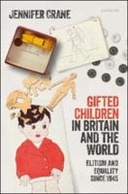Explore

'Gifted Children' in Britain and the World
Jennifer Crane
2025
0 Ungluers have
Faved this Work
Login to Fave
The idea that a child is intellectually ‘gifted’ has a social and cultural history. This book analyses that social history at multiple scales, and makes the ‘voices’ of the gifted young themselves central. In daily encounters, those labelled ‘gifted’ sometimes loved this label, and felt special in comparison to peers at school and siblings at home. For others, ‘gifted’ was a silly or embarrassing label, and many questioned the idea of separating off young people in terms of intelligence, as well as specific forms of testing. Ideas of the gifted child also reshaped family lives—parents dedicated time to providing special leisure spaces, running them in their own homes and taking their children significant distances to spend time with others. Voluntary organisations were critical here, as the network through which young people and adults encountered the term, ‘gifted’, and lived and created it relationally. Voluntary organisations, looking to gain attention and visibility, also critically shaped the idea that the gifted young were elites of ‘the future’, central to answering challenges of economic decline, global warfare, or humanitarian aid. The hopes placed on gifted children between the 1960s and the 1990s were often sky high—yet many gifted young still felt that the community ‘wasted’ their talents, and did not support them. This book, then, provides new perspectives on the tensions between elitism and equality in modern Britain. It also offers vivid stories of optimism, hope, disappointment, and criticism, in which young people themselves play a central role.
This book is included in DOAB.
Why read this book? Have your say.
You must be logged in to comment.
